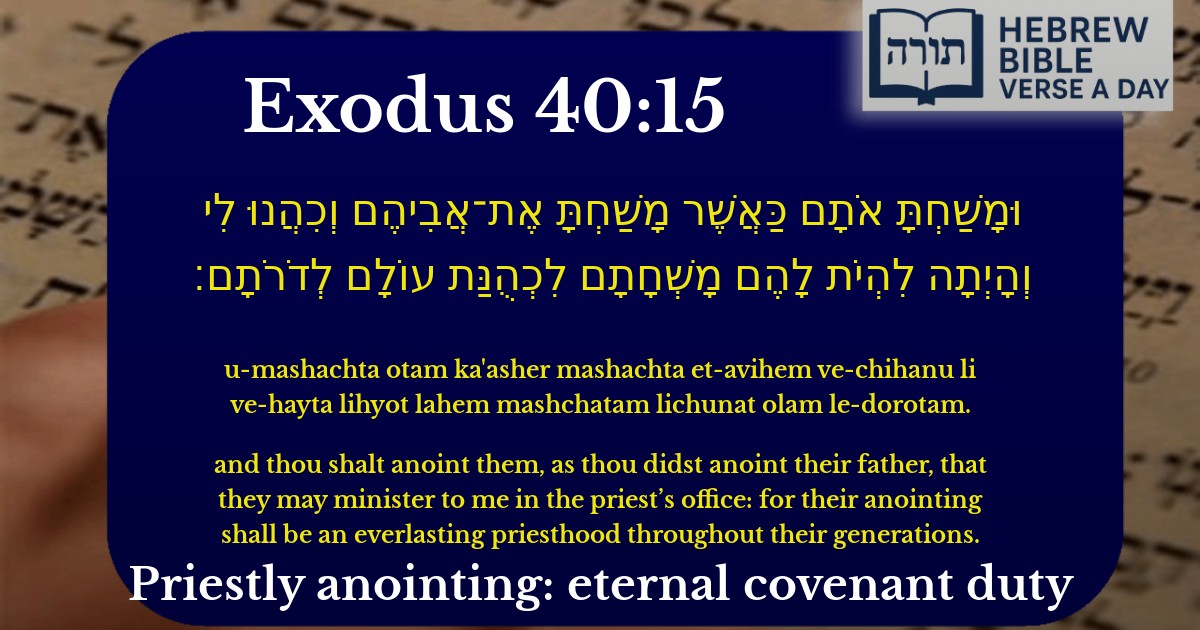Join Our Newsletter To Be Informed When New Videos Are Posted
Join the thousands of fellow Studends who rely on our videos to learn how to read the bible in Hebrew for free!
Hebrew Text
וּמָשַׁחְתָּ אֹתָם כַּאֲשֶׁר מָשַׁחְתָּ אֶת־אֲבִיהֶם וְכִהֲנוּ לִי וְהָיְתָה לִהְיֹת לָהֶם מָשְׁחָתָם לִכְהֻנַּת עוֹלָם לְדֹרֹתָם׃
English Translation
and thou shalt anoint them, as thou didst anoint their father, that they may minister to me in the priest’s office: for their anointing shall be an everlasting priesthood throughout their generations.
Transliteration
U-mashachta otam ka'asher mashachta et-avihem ve-chihanu li ve-hayta lihyot lahem mashchatam lichunat olam le-dorotam.
Hebrew Leining Text
וּמָשַׁחְתָּ֣ אֹתָ֗ם כַּאֲשֶׁ֤ר מָשַׁ֙חְתָּ֙ אֶת־אֲבִיהֶ֔ם וְכִהֲנ֖וּ לִ֑י וְ֠הָיְתָ֠ה לִהְיֹ֨ת לָהֶ֧ם מׇשְׁחָתָ֛ם לִכְהֻנַּ֥ת עוֹלָ֖ם לְדֹרֹתָֽם׃
וּמָשַׁחְתָּ֣ אֹתָ֗ם כַּאֲשֶׁ֤ר מָשַׁ֙חְתָּ֙ אֶת־אֲבִיהֶ֔ם וְכִהֲנ֖וּ לִ֑י וְ֠הָיְתָ֠ה לִהְיֹ֨ת לָהֶ֧ם מׇשְׁחָתָ֛ם לִכְהֻנַּ֥ת עוֹלָ֖ם לְדֹרֹתָֽם׃
🎵 Listen to leining
Parasha Commentary
📚 Talmud Citations
This verse is not quoted in the Talmud.


Anointing the Kohanim
The verse (Shemot 40:15) describes the commandment to anoint Aharon's sons just as their father was anointed, establishing their eternal priesthood. Rashi explains that this anointing with the shemen hamishcha (holy anointing oil) signifies their sanctification for divine service, just as their father Aharon was sanctified. The phrase "כַּאֲשֶׁר מָשַׁחְתָּ אֶת־אֲבִיהֶם" ("as you anointed their father") emphasizes continuity in the priestly role, ensuring that future generations inherit the same kedushah (holiness).
Everlasting Priesthood
The phrase "לִכְהֻנַּת עוֹלָם לְדֹרֹתָם" ("an everlasting priesthood throughout their generations") underscores the permanence of the Kehunah (priesthood). The Rambam (Hilchot Klei HaMikdash 1:7) teaches that this anointing was not merely symbolic but conferred an immutable status—once a Kohen, always a Kohen, even if he sins. The Midrash Tanchuma (Tetzaveh 14) further elaborates that this eternal covenant reflects Hashem's unchanging promise to the descendants of Aharon.
Spiritual Inheritance
The Talmud (Zevachim 17b) derives from this verse that the anointing of Aharon's sons was necessary to fully induct them into the priesthood, even though they were already Kohanim by lineage. This teaches that spiritual roles require both hereditary rights and formal consecration. The Kli Yakar adds that the repetition of "וְכִהֲנוּ לִי" ("that they may minister to Me") emphasizes that their service must be purely for the sake of Heaven, not for personal honor.